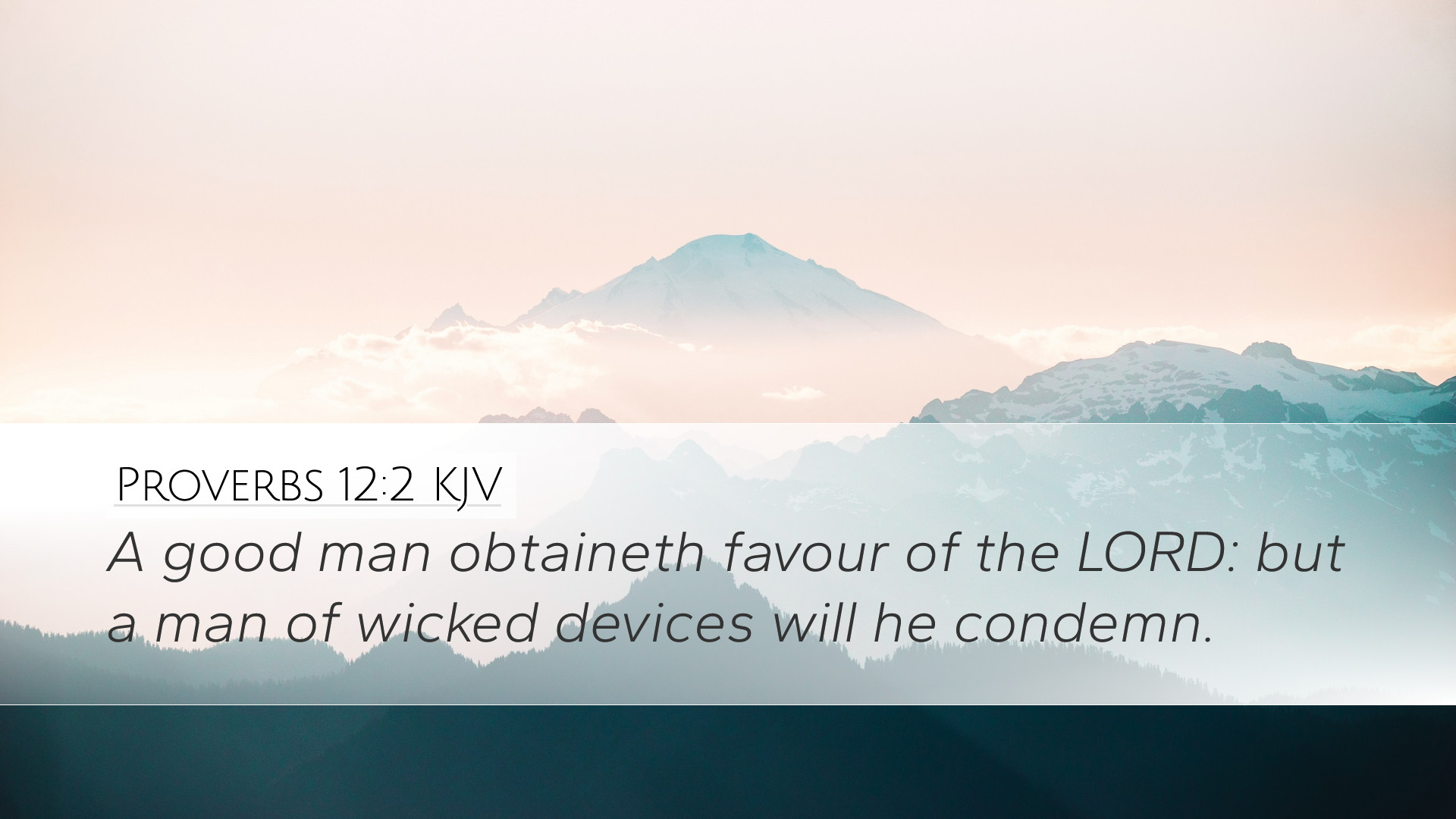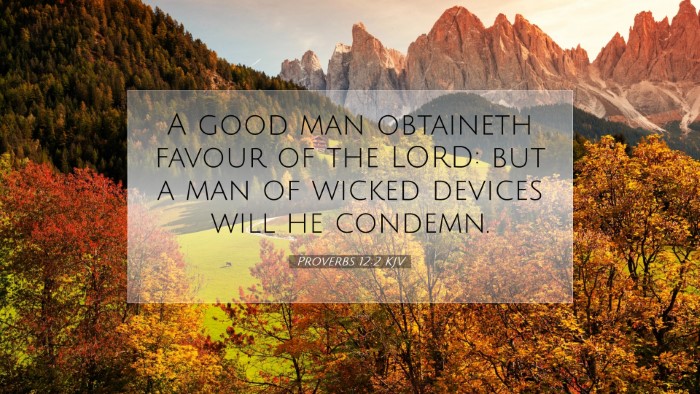Commentary on Proverbs 12:2
Verse: "A good man obtaineth favour of the Lord: but a wicked man entertaineth his wrath."
Introduction
This verse succinctly captures the essential moral dichotomy between the righteous and the wicked. The wisdom literature of Proverbs often contrasts the two, imparting practical lessons about the outcomes of one's behavior and character. The insights provided through the public domain commentaries shed light on the depth of this verse, making it meaningful for pastors, students, theologians, and Bible scholars alike.
Insights from Matthew Henry
Matthew Henry, in his comprehensive commentary, views this verse as an affirmation of divine favor towards righteousness. He emphasizes that while God's grace is available to all, it is particularly evident in the lives of those who live according to His commandments. Here are the key insights from Henry:
- Divine Favor: The idea of a "good man" obtaining favor from the Lord reflects God's grace. It implies that righteousness is rewarded with God's blessings.
- The Nature of Goodness: Henry elaborates on what constitutes a "good man" - someone who fears God, walks in His statutes, and does justly.
- Contrast with the Wicked: The wicked, on the other hand, do not experience God's favor and instead face His wrath. This notion reinforces the consequences of sin and moral failing.
- Practical Implications: For the faithful, this verse serves as encouragement; for the unrighteous, it serves as a warning. Henry stresses the importance of aligning one's life with God's will.
Insights from Albert Barnes
Albert Barnes offers a thorough exegetical approach to Proverbs 12:2, presenting the theological implications of favor and wrath. His analysis involves the following points:
- Divine Favor Explained: Barnes argues that the term “favor” involves acceptance, blessing, and grace bestowed by God, particularly upon those whose actions align with His character.
- Wickedness Defined: The "wicked man" is characterized not only by moral failing but also by obstinacy in opposing God's ways. Their path leads to inevitable consequences, as Barnes outlines.
- Contextual Reflections: The commentary reflects on the broader context of Proverbs, revealing that throughout the book, the distinction between good and evil is a recurring theme, underlining divine justice.
- Encouragement for the Faithful: Barnes encourages believers that their trust in God and commitment to righteousness will deepen their relationship with Him and shall yield divine favor in their lives.
Insights from Adam Clarke
Adam Clarke provides a detailed analysis of the Hebrew language and its implications for understanding Proverbs 12:2. His observations include:
- Translation Nuances: Clarke emphasizes the significance of the original Hebrew wording, which reinforces the idea of “favor” as an active divine presence in the life of the obedient.
- The Two Paths: He elaborates on the metaphorical paths of the good and the wicked, suggesting that each individual is on a journey that either leads to divine favor or to destructive wrath.
- Historical Context: Clarke brings historical and cultural context into play, illustrating how the ancient Israelites viewed favor and wrath in relation to their covenant with God.
- Final Exhortation: Clarke urges contemporary readers to seek a relationship with God that aligns with righteousness, as this is the key to receiving His enduring favor.
Theological Themes
As we synthesize the insights from the commentaries, several theological themes emerge from Proverbs 12:2:
- Righteousness and Divine Favor: True righteousness is integral to experiencing God's favor. The faithful should strive to embody the principles of justice and mercy.
- The Certainty of Divine Judgment: The text accentuates the certainty of God's judgment against wickedness, emphasizing that the moral order established by God prevails.
- The Nature of God's Relationship with Humanity: The verse reflects God's desire for a relationship founded on righteousness, showcasing His grace in empowering believers to live accordingly.
Practical Applications
For pastors, students, theologians, and scholars, Proverbs 12:2 offers profound practical applications:
- Encouragement for Righteous Living: This verse serves as a reminder for believers to pursue holiness and integrity, assuring them of God’s favor.
- The Need for Repentance: For those who recognize their wickedness, this is a call to repentance and seeking divine grace, emphasizing the importance of turning back to God.
- Teaching Tool: For pastoral ministry, this verse can be a vital teaching tool in educating congregations about the character of God and the importance of living lives that honor Him.
- Encouragement for Those Struggling: For individuals facing adversities, understanding that favor comes through righteousness can be motivational and offer hope amidst challenges.
Conclusion
Proverbs 12:2 encapsulates a powerful message regarding the favor of God extended toward the righteous and the consequences awaiting the wicked. The commentary insights from Matthew Henry, Albert Barnes, and Adam Clarke collectively provide a rich tapestry of understanding that underscores the importance of moral integrity and faithfulness in the life of a believer. As pastors, theologians, and scholars engage with this text, they are enriched by the call to embody righteousness and the assurance of divine favor that accompanies a life lived in accordance with God’s will.


